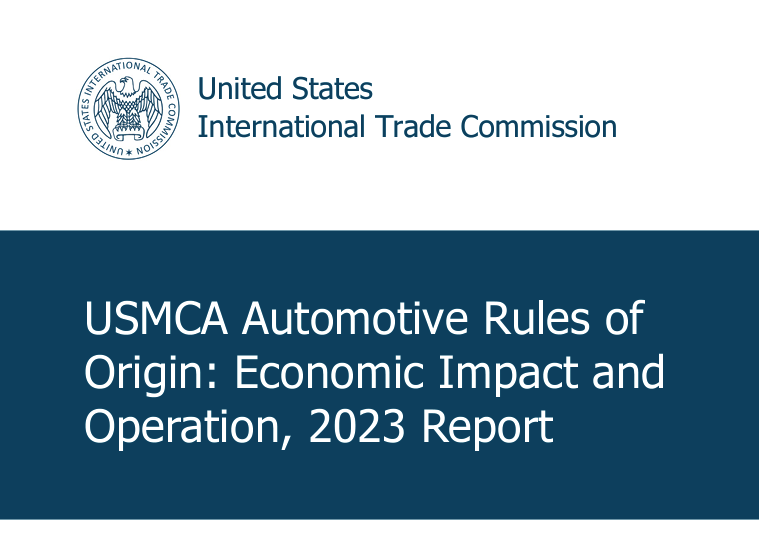USMCA AUTOMOTIVE RULES OF ORIGIN
The International Trade Commission (ITC) recently released its first USMCA Automotive Rules of Origin: Economic Impact and Operation report. The report is mandated by section 202A(g)(2) of the USMCA Implementation Act. This Act requires the USITC, an impartial federal agency responsible for factual investigations, to provide five biennial reports to the President, the House Committee on Ways and Means, and the Senate Committee on Finance. Subsequent reports are scheduled for 2025, 2027, 2029, and 2031.
IMPACT ON AUTO INDUSTRY
The report highlighted the impact of the change from NAFTA to USMCA Rules of Origin (ROO) on the automotive industry and revealed the the following findings:
The transition to USMCA ROO led to increased sourcing of auto parts from Canada and Mexico by U.S. automakers and stimulated parts production in these countries.
The labor value content rules in the new agreement raised labor costs, resulting in production relocation to the U.S. and Canada.
USMCA’s steel and aluminum purchasing requirements increased sourcing and production of these materials from USMCA countries. It also raised input costs, leading to higher imports of light vehicles from other regions while reducing U.S. imports of light vehicles from Canada and Mexico.
Production slowdowns in 2020 and 2021 were attributed to the COVID-19 pandemic and semiconductor chip shortages, despite the positive estimated impact of the ROO on U.S. production.
Alternative staging plans under the agreement impacted fewer than 15% of models produced in USMCA countries. These models amount to roughly 22% of North American production and a small percentage of U.S. sales. Most alternative staging plans are expected to conclude by mid-2025, with a few extending until mid-2027.
“Production, trade, employment, and investment data trends from 2018 to 2022 showed few signs of changes in the overall competitiveness of the U.S. automotive industry after USMCA’s entry into force in 2020. Production shutdowns due to the COVID-19 pandemic and semiconductor chip shortages were likely the main factors in the aggregate declines in U.S. vehicle and parts production in 2020 and 2021 that occurred despite the positive estimated impact of the ROOs on U.S. production…”
International Trade Commission Press Release
The new agreement has only been in force since July 2020 and, according to the ITC, “the full impact will likely not be apparent until the agreement is fully implemented, in 2027, or later.”
Stay up-to-date on freight news with Green’s Weekly Freight Market Update by following us on Facebook, Instagram, and LinkedIn. For continuous updates, make sure to check out our website at greenworldwide.com.






